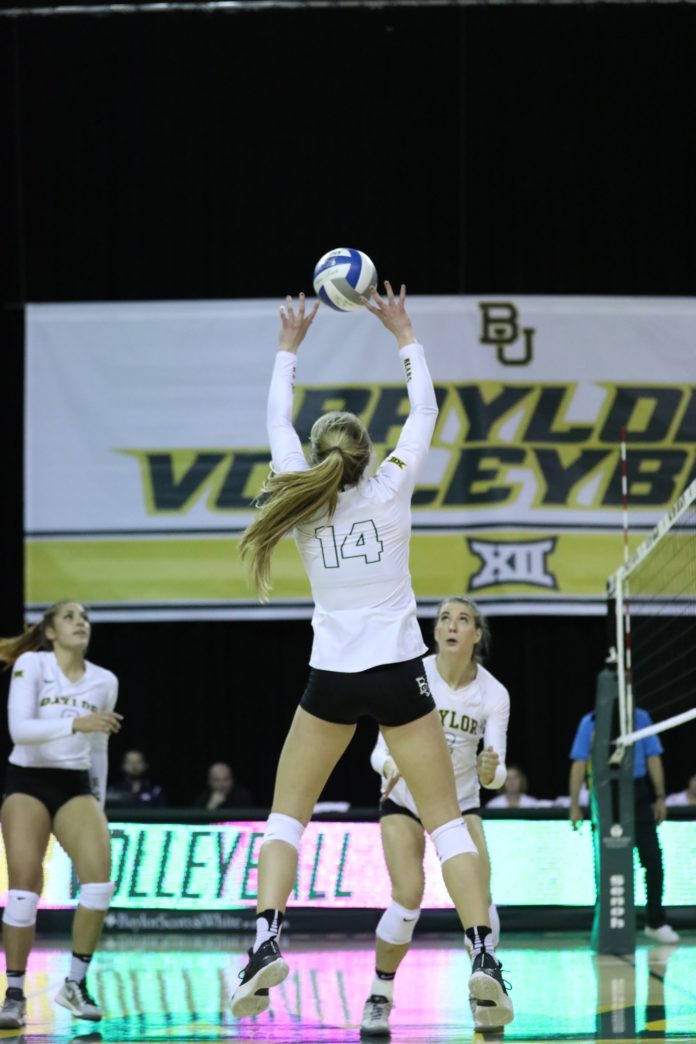
By Nathan Keil | Sports Editor
The challenge review system in NCAA volleyball is getting a minor makeover during the 2018 season.
The NCAA Playing Rules Oversight Panel voted Feb. 22 to approve a change that would combine in/out and touch calls into one reviewable challenge.
During the first two years of the review system, in/out and touch calls have been the two most reviewed plays in the sport, as well as separate challenges. Since they have been separate, some calls have not been able to be overturned because a challenge has fallen under one or the other.
Baylor head coach Ryan McGuyre said the new legislation was a no-brainer, because it makes the job easier as well as focuses on the main goal of getting the call right.
“The goal of all instant replay is to get the call right, so as you look across other sports that have instant replay, the goal is to get it right. So sometimes touching the player, not touching, in or out,” McGuyre said. “It combines it and makes it easier for coaches so we no longer have to choose when we know it was close and it’s a pivotal part of the game.”
In 2018, coaches will also be able to challenge three-meter attacks, a rule that has been difficult for officials to monitor due to the varying degrees of athleticism from the student-athletes.
McGuyre is also in favor of the three-meter attack change because it serves as a point of accountability the same way monitoring foot-faults on serves does.
“Three-meter line makes sense if you’re going to do foot faults on serves; you basically have to do that on the back row attack,” McGuyre said. “I think most officials do a good job watching for them, but sometimes those happen quickly and its definitely an advantage if it’s not being watched and measure.”
With the change, coaches will be able to challenge the three-meter attacks. Coaches will also be granted an additional challenge in the match extends to a fifth set. If a coach does not use his/her challenges from previous sets in the match, they will also carry over into the decisive final set.
The NCAA Playing Rules Oversight Panel also simplified rules regarding libero jersyes, stating that each team’s defensive specialist must be recognized immediately from all places on the court based on the difference in their jersey.
It also reduced the intermission time between the second and third sets from 10 minutes to five minutes, in hopes of improving play pace.
In April, the NCAA Playing Rules Oversight Panel will be voting on key issues of recruiting, including moving the official visit day a year ahead to Sept. 1 of the athlete’s junior year as well as voting on a bill that will outlaw all recruiting conversation prior to Sept. 1 of the junior year.
McGuyre said he supports moving the official visit date to Sept. 1 because it remedies some of the pressure of early recruitment. However, he added that he is against not having any recruiting conversation because it diminishes the atmosphere of visits.
“We want girls to be able to come to games and hang out with the girls afterwards and be a part of the community,” McGuyre said. “I hope that one doesn’t pass and that one’s a little bit too restrictive.”
Baylor volleyball is coming off its best season under McGuyre. The Bears went 24-7, finished second in the conference with a 13-3 record and advanced to the NCAA Tournament second round for the second straight year.
Baylor will start its spring season with a March 24 tournament. The tournament will be from 11 a.m.-2 p.m. and will feature the University of Texas, Texas State, University of North Texas and several other Texas schools to be determined.





